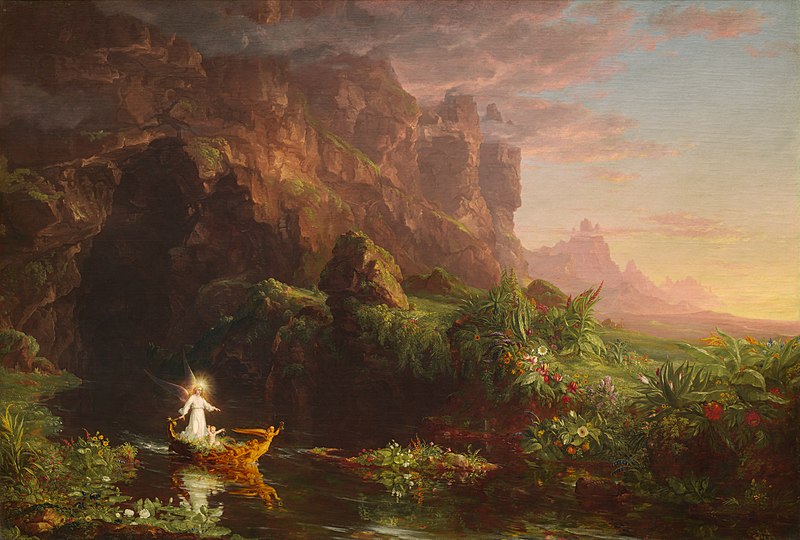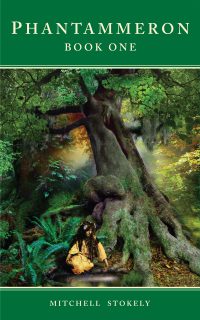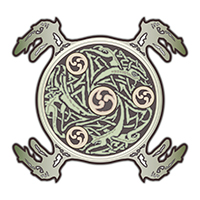In the Biblical story of the Garden of Eden, with the Tree of the Knowledge of Good and Evil, I have seen how that ancient myth has over time merged with a deeper spiritual meaning to form something quite beautiful and unique that says something profound about our connection with Nature and God, our bond to the opposite sex in romantic love that’s pure and true, and the tragedy of the fate of all life that leads to its eventual pollution and death.

In my fiction, I tap into lots of ancient myths, including modern religious themes. One of the stories that dominates the second half of the Phantammeron novel is the theme of the Garden of Eden.
I decided to use the Biblical story of a perfect holy place – a pristine Garden of the Gods – as the central metaphor of perfect love in my first book.
In the story, Ana and Ama, a young boy and girl, fall in love in the Gardens of Abrea…a secret paradise of great beauty in the heart of the forests of Phantaia. As youth, like Adam and Eve, these two characters represent not only the concept of a Creator and his desire for connection to his Creations, but also pure romantic love between a man and a woman….. unblemished and true. Yet there is the spiritual message, too…..of Nature and our lost yet eternal connection to her that is sacred and profound. All these concepts I explored in the Phantammeron through the garden idea.
But the garden and the innocent love story also represents the purity of ourselves….of our own love for ourselves, for life, for our innocence and childhood, and the purity of our own spirits untouched by the evils of the outer world.
When I came up with this theme, it fit perfectly with the larger theme of the Phantammeron which was the destruction of innocence later and the creation of the pool later by Ana. This theme of “resurrection” is about the transition from living life to spiritual life….of the soul’s rebirth in us. That story was to be surrounded by many other sub-plots and threads that swirled around the grander story of youthful innocence and love, but also the singular and yet mysterious meaning of the Sacred Pool in all my books……supporting it yet contradicting it at times.
When the boy and girl in that story meet in the garden they slowly build a friendship with adventure until they find love for each other at the end. And so the love that grew between them grows until at the end their paradise is destroyed. The main theme of the remaking of the enchanted pool then takes over.
Interestingly you’ll notice I honor the Biblical tale in that Ana, the main female protagonist is tempted and so is responsible for the gardens eventual destruction. But unlike the Biblical narrative, the woman is the garden’s redeemer. And so like the European Earth Mother, she is the one that rebirths Phantaia and the gardens anew in the first book. (the female archetype is very powerful in all my books).
My point in sharing the Garden of Eden metaphor is NOT to reflect on Christian morality but its mythological and spiritual symbolism. Thats what the Garden of Eden tale used to represent before very uninspired Christian Americans the past 50 years destroyed its poetic mystery. Sad but true. And its why organized, socialized religion is dying today.
It wasn’t my arrogance in using the Eden tale to try and say I have the meaning or its understanding. I don’t. It was just my attempt at using Biblical and religious story and myth to drag up some of its original spiritual meaning to convey a message I had. And so my use of perfect romantic love in a perfect idyllic setting was extremely fun to write and use, and powerful as well, especially after seeing so much sex, drugs, and violence in modern books and modern romance I had read.
I will write about youthful innocence and perfect love in future books. Its very much an anti-modern ideal that is full of potential and power in connecting us with what we have lost most and desire most in the spiritually-stripped, hollow, Modern world we live in today.
In the Phantammeron, I have use the beautiful idea of young love in a garden called Abrea as the basis for the book and its reflection on the eternal truth and joy and hope that comes from young love. Ama and Ana become the young couple in my book that embrace that concept…..of a young man and a young woman who discover themselves and each other in the beautiful setting of an eternally youthful and green garden in the book.
I wanted to make a statement about that “Adam and Eve” idea in the Phantammeron because I had always felt something innocent and pure had been missing from so much modern literature. And I wanted to make a bold statement that young people in their early romantic lives experience something that is yet free and pure, that cant be bought or sold on Wall Street or sold in a product. And I wanted to say something about the purity of love and its beauty and truth as connected to Nature. And so in my book Ama and Ana’s love story becomes a vital part of the story.
But so too is the temptation of Eve told in the book, but not as a morality tale, or from the view of temptation or rejection of God or rebellion. It was told from the much older Celtic Goddess water-form, where the female archetype embraces her role in story as the source of a vital spring or well that sustains the garden itself. And so I twisted the Garden of Eden myth to be more Celtic and hopefully have more power.
So in the end of the book, when Ana drinks from the Sacred Pool on the hill and pollutes it, she becomes the true destroyer of Phantaia. But her destructive act – like the Female European Earth Mother in myth – also becomes the source of the garden’s rebirth, which is quite the opposite of the Biblical story. And so I move from Adam and Eve as young love to the more primal truth of the Phantammeron story which is Mankind’s essential and vital connection to Nature and Nature to us in myth.
– the Author
Created Aug 4, 2017, 3:18 AM



